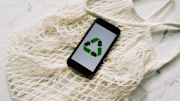Decluttering tips for a safer, less-stressful home
Recycling made easy

As a society, we’ve become far more aware of the dangers our mass consumption is having on the environment.
While positive change is happening gradually through things like plastic bag charges and the rise of reusable coffee cups, it isn't happening quickly enough.
Ideally we wouldn’t need to recycle, we would all just use less in the first place. But that's not always possible, so it’s important to recycle in ways that will ensure maximum environmental sustainability.
With only 43% of household waste recycled in 2022-23, it’s critical that we all make a conscious effort to do more. To give you a head start, we’ve outlined our top tips for becoming a waste warrior.
Look up what you can recycle
Different councils have different rules, so it’s important to check what can and can’t be recycled in your area. Luckily, the government has provided a handy tool on its website, where you can find out if your council collects recycling and how to recycle household waste in your local area.
Drinks bottles
Where possible, avoid buying plastic bottles and instead purchase a refillable, reusable alternative. If you do need to buy plastic bottles, make sure the lid is attached before recycling them.
Supermarket recycling
The obvious one is to take your own bags to pack your shopping. Not only are you doing your bit to save the environment, you’re also saving yourself some money. If you do find yourself with too many plastic carrier bags, most big supermarkets have a recycling point for them.
Empty and rinse recycling
Before you recycle, make sure you give the items a quick rinse. They don’t need to be pristine, but removing residual food waste will help make sure other more porous products such a card or paper aren’t contaminated if they are in the same recycling load.
Use leftovers
Avoid throwing away food wherever possible. Last night’s dinner leftovers can work well for lunch the next day. Most councils now offer food waste disposal, so use these for things like vegetable peelings if you don’t have a compost pile.
House recycling bins
If you can, invest in recycling bins in areas of the house with high volumes of recycling. The kitchen is an obvious one, but don’t forget about the bathroom. Items such as shampoo bottles and bubble bath are often overlooked, so it helps to have a dedicated recycling bin somewhere close to hand to put them.
Charity shops
Unwanted clothes and items can be donated to charity shops. This is a double win because they don’t go to landfill and the charity can make money from them. It’s also a good idea to buy clothes from charity shops rather than brand new when possible. Check out our article on what you can and can’t donate.
Exclusive offers for Co-op Members

Home insurance
Exclusive member price on home insurance.
Your discount is not available on add ons and is applied if your details match those on our membership database.

Renters insurance
Co-op Members who take out renters insurance will get a 5% discount.
Member discount applied if matched during quote process.





